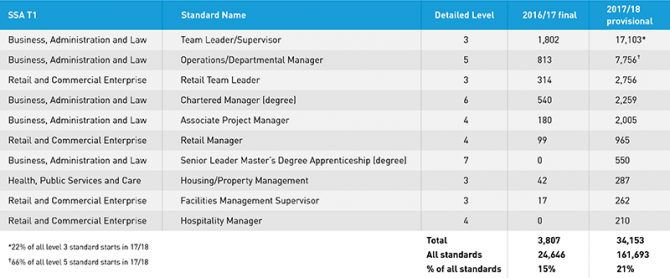The proportion of learners taking management apprenticeships has doubled in the last two years, with just ten of the controversial standards now making up a fifth of all apprenticeship starts on standards.
FE Week found that a single management-apprenticeship standard was responsible for a staggering 66 per cent of all level five starts on standards last year, according to the provisional data for 2017/18 released by the Department for Education last month, while another made up 22 per cent of all level three starts.
When excluding level-two apprenticeship standards, the proportion of management starts last year rises to 30 per cent.
Concerns have been expressed over the popularity of management apprentices, and the question of whether large sums from the apprenticeship levy should be focused on upskilling employees rather than encouraging new people into the workforce.
Tom Richmond, a senior research fellow on education and skills at Policy Exchange and former government advisor, warned the government should “prioritise training young people in important sectors and occupations ahead of paying for senior executives to do an MBA”.
“Labelling management and leadership-training courses as an ‘apprenticeship’ means that more and more funding is being directed a existing employees instead of young people trying to get started in their chosen career,” he said.

“The apprenticeship levy should support genuine apprenticeships in skilled occupations, and any misuse of the levy funds could damage the apprenticeship brand.”
However, a spokesperson for the Institute for Apprenticeships said it was working with employers “to help them develop the apprenticeships that businesses need”.
“This means the right kind of apprenticeships that will lead to longer term employment, close the skills gap and ultimately help our economy grow.
“Apprenticeships in management are popular with apprentices and employers, as most people who progress to more senior levels need management skills,” he added.
In 2015/16, approximately nine per cent of all new starts at all ages and all levels were management apprenticeship frameworks. This grew to 15 per cent for standards in 2016/17, before taking the leap to 21 per cent by 2017/18.
Two standards in particular have seen their popularity skyrocket. The level five operations/departmental manager standard made up two thirds of all level five standards in 2017/18, having grown in one year from 813 apprentices to 7,756.
And the level three team leader standard made up over a fifth of all level three standards last year, growing from 1,802 apprentices to 17,103. The level three team leader standard is now the most popular of all, with the level two adult care worker standard taking the second top spot with 10,463 starts last year.
However, both these popular management standards are in line to have their funding rates slashed following a review into funding bands by the IfA.
The level five operations/ departmental manager standard was set to drop from £9,000 to £7,000, while the level three team leader/supervisor standard faced cuts from £5,000 to £4,500.
Also facing the chop is the level six chartered manager degree apprenticeship, which could see its funding cap cut from £27,000 to £22,000.
The fate of all three standards has not yet been decided, after the employer group behind them appealed with, they claimed, more than 150 employers joining forces to protest against the “extensive and highly damaging cuts”. The outcome of the appeal is still pending.
In total, 34,153 apprentices took part in a management standard last year, compared with just 3,807 the year before.
Anne Milton, the skills minister, said reforms to the apprenticeship system had been to create “long-term investment in skill straining”.
“There are now high-quality management apprenticeships available in lots of different sectors, creating the leaders our businesses need to grow.
“Apprenticeships are designed by employers themselves and the apprenticeship levy lets them choose where to spend money on training, based on their individual needs,” she said.
However Robert Halfon, chair of the education select committee and former skills minister, has previously warned that employers might try to “game the system” by rebranding existing training in order to claw back as much of their levy contribution as possible.
Speaking at the Conservative party conference in October 2016, Mr Halfon said: “I’m not going to deny to you, inevitably there may be some gaming of the system.
“But I don’t actually believe it will be widespread. If gaming is widespread… then of course we would look at it later on and make sure we stop it as much as possible.”








When we are claiming there is a massive underspend on the levy – what is the problem with spending funds on management apprenticeships? Over the years I have seen a huge deficit in management skills despite people being in those positions. Surely, the apprenticeships will help with this? From experience, my Level 3 management apprenticeship was very helpful when I first moved into a management position. So why not upskill when there is a need to upskill?